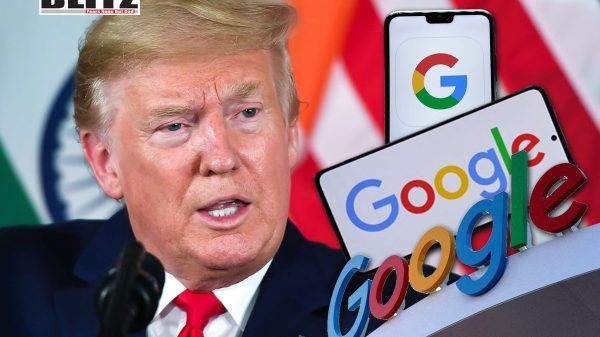Trump again accuses Google of election interference
- Update Time : Sunday, September 29, 2024

On September 27, 2024, former US President Donald Trump made headlines once again by accusing Google of displaying only negative stories about him and suppressing positive coverage. In a post on his Truth Social platform, Trump alleged that the tech giant is engaging in “illegal activity” by manipulating search results to interfere with the upcoming presidential election. He also vowed to prosecute the company if he wins the 2024 election, framing it as an effort to combat election interference. However, Trump provided no concrete evidence to back up his claims, raising questions about the legitimacy of his accusations and further highlighting the deep political divide in the US surrounding tech companies and media bias.
In his Truth Social post, Trump lashed out at Google, accusing the company of showing only “bad stories” about him while promoting positive articles about his Democratic rival, Vice President Kamala Harris. He called this alleged bias a form of election interference, stating, “This is an ILLEGAL ACTIVITY, and hopefully the Justice Department will criminally prosecute them for this blatant Interference of Elections.” Trump further added that if the Department of Justice fails to act, he will push for Google’s prosecution “at the maximum levels” should he return to the White House.
The timing of this accusation is crucial, as it comes during a contentious 2024 presidential race in which Trump is once again the Republican front-runner, while Harris, the sitting Vice President, represents the Democratic Party. Trump’s remarks appear to be aimed at rallying his base, particularly those who believe tech companies and mainstream media are unfairly biased against conservatives.
Trump’s accusations against Google align with longstanding concerns within conservative circles about perceived bias in Big Tech platforms, including Google, Facebook, and Twitter (now known as X). Conservative figures have repeatedly claimed that tech companies manipulate algorithms to suppress right-leaning content while promoting liberal viewpoints. These accusations have been amplified in recent years, especially following the 2020 election, where Trump and his supporters claimed without evidence that tech companies and social media platforms censored their messages and allowed the spread of misinformation favoring Democrats.
In this latest attack, Trump cited a conservative group’s findings that when searching “Donald Trump presidential race 2024,” negative stories about him dominated the results. In contrast, searches related to Kamala Harris reportedly displayed favorable coverage. While Trump didn’t name the group in his post, the allegation echoes concerns raised by various conservative advocacy organizations.
In response to these accusations, Google has categorically denied manipulating its search results to favor any political candidate. A spokesperson for the tech giant emphasized that both Trump’s and Harris’s campaign websites consistently appear at the top of search results for relevant queries, such as “Donald Trump presidential race 2024.” Google attributed the conservative group’s findings to a single rare search term on a specific day, dismissing the broader claim of systemic bias.
Google also highlighted that its search algorithm is designed to prioritize timely and popular topics, which means that news stories featuring Donald Trump-often involving his numerous legal battles-might naturally receive higher rankings in search results due to their relevance and public interest.
The company has consistently denied manipulating its search engine to influence political discourse or elections. However, Google’s internal workings remain largely opaque, fueling speculation and criticism from various political factions. Critics of Google’s practices argue that the lack of transparency in the company’s algorithm allows for potential bias, intentional or not, while defenders claim that the algorithm simply reflects public interest and topical relevance.
Trump’s accusations are part of a broader narrative in American politics where politicians on both sides of the aisle have scrutinized Big Tech. While conservatives often argue that tech platforms suppress right-wing voices, liberals contend that these companies allow misinformation and hate speech to spread unchecked. For example, Democrats have criticized social media platforms for their role in spreading false information about COVID-19, climate change, and the integrity of elections, particularly in the lead-up to the January 6, 2021, insurrection at the Capitol.
Trump’s promise to prosecute Google if re-elected echoes his previous threats against tech giants. During his presidency, Trump sought to challenge the legal protections granted to social media companies under Section 230 of the Communications Decency Act, which shields them from liability for user-generated content. These efforts failed, but Trump has made clear that his campaign against Big Tech would continue if he returns to power.
While Trump continues to accuse tech companies of bias, he is simultaneously facing a raft of legal challenges. These include civil and criminal cases related to sexual abuse allegations, the payment of hush money to adult film actress Stormy Daniels, and attempts to overturn the 2020 election results. Perhaps most significantly, Trump is facing charges for his role in allegedly inciting the January 6 Capitol riot and attempting to interfere with the peaceful transition of power to President Joe Biden.
These legal battles, which dominate much of the news coverage surrounding Trump, may partially explain why searches for his name bring up negative stories. The former president’s legal entanglements have naturally become major news topics, contributing to his perception of biased coverage.
Donald Trump’s recent accusations against Google are yet another example of his ongoing battle with Big Tech, one that began during his presidency and has escalated as he campaigns for the 2024 election. While Trump’s claims of bias and election interference may resonate with his base, they remain unsubstantiated and have been denied by Google. The larger issue of how tech companies influence public discourse and elections continues to be a contentious topic, with politicians on both sides pushing for reforms. As the 2024 election approaches, the role of Big Tech will undoubtedly remain a central issue in America’s political landscape, with Trump leading the charge in calling for increased scrutiny and accountability.











